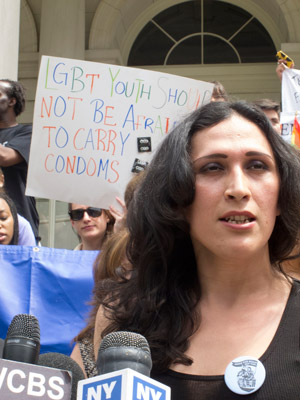
At a rally at City Hall earlier this month, a transgender person spoke out against using condoms as evidence.
BY GERARD FLYNN | In a city like New York, with the largest H.I.V./AIDS population in the nation, there are few among us who would ever say that you should not carry condoms.
But some in the sex industry and in the gay, lesbian and transgender community are doing just that. They are leaving behind prophylactics for fear that, if found in possession of them by police, they could face prostitution charges, because of a state law that allows prosecutors to use condoms as evidence in court.
At a press conference on the City Hall steps earlier this month, opponents of the law, including New York district attorneys and city councilmembers, rallied for change, demanding the passage of a bill, stuck in both chambers of the state Legislature, that would stop prosecutors from using condoms as evidence of prostitution in court.
City and state legislators, as well as legal and human-rights groups, told the rally that discouraging sex workers and L.G.B.T. individuals from carrying condoms can promote the spread of sexually transmitted diseases, including H.I.V./AIDS, an ironic and somewhat “schizophrenic” twist, since the city is running a campaign to promote condom use to prevent S.T.D.’s and unwanted pregnancies.
They called on Albany to pass the so-called “No Condoms as Evidence” bill, or S1379/A2736. They said the law also needs to be changed because it unfairly targets members of the gay and transgender community, particularly the latter group.
Johanna Vasquez, who is transgender, told the crowd of about 40 how she had been stopped by police several years ago as she walked along Roosevelt Ave. in Queens. Despite pleading her innocence, the discovery of a single condom in her possession landed her in jail for a year, due in part to her immigration status.
A report by Human Rights Watch released last July explained in alarming language how sex workers, particularly transgender women, faced arrest for possession of condoms, which involved “degrading treatment and abuse at the hands of the police. For immigrants,” the report said, “arrest for prostitution offenses can mean detention and removal from the United States.”
Socheatta Meng, legislative counsel at the New York Civil Liberties Union, called the passage of the legislation a matter of good public health policy, and common sense, and said it would encourage all New Yorkers — especially those individuals who are regularly stopped by the police — to use condoms.
The dangers to sex workers and the city at large was amplified by Jim Vogel, representing state Senator Velmanette Montgomery, who has been sponsoring the bill for nine consecutive years. He said that a sex worker who stopped using condoms due to this law could infect potentially hundreds within a month.
The bill in Albany has been a victim, to some extent, of what Vogel called “Downstate/Upstate” politics and a conservative unwillingness to “rock the boat.”
Since 1999 the bill has consistently “died in committee.” Its poor record in Albany, however, isn’t deterring some city councilmembers, who are pushing for a resolution on the bill. Although the city legislature wields limited influence in Albany, Brooklyn Councilmember Steven Levin urged Queens Councilmember Peter Vallone, Jr., chairperson of the Public Safety Committee, to schedule a hearing on the resolution, and one was subsequently held.
The resolution, Levin said, puts the City Council on record as saying this should be policy in the city and state, and will put pressure on the state Legislature to act.
Some prosecutors have independently taken action to stop the use of condoms as evidence in criminal or civil trials. Like her colleague, Brooklyn District Attorney Charles Hynes, Nassau County D.A. Kathleen Rice has adopted a comprehensive policy banning the use of condoms as evidence in any prostitution-related cases, including trafficking cases, a move that followed an announcement from San Francisco prosecutors that they will cease submitting condoms as evidence.
City Council Speaker Christine Quinn, while not present at the rally, wants the law changed.
“No person anywhere should have to refrain from carrying condoms for fear of arrest or prosecution,” she said. “Condoms are life-saving devices and should not be used as evidence.” Condoms should be encouraged, not discouraged, she said.


































